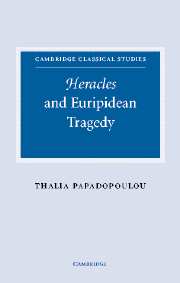3 - Arete and the image of Athens
Published online by Cambridge University Press: 22 September 2009
Summary
Introduction
The previous chapter focused on the interrelated themes of madness and divinity in the play. Madness becomes a dramatic device which problematizes the question of Heracles' valour, and which also moves the plot towards an Athenian context. When Heracles recovers from his mad fit, he resolves to commit suicide, but the intervention of Theseus, the representative of Athens, succeeds in dissuading him from killing himself. The crucial role of Theseus and of Athens invites a consideration of the political overtones of the play. At the same time, the change in the plot, with Heracles' decision to live, brings to the fore the issue of Heracles' arete, ‘excellence’, which is variously illuminated throughout the play. This chapter deals with the related issues of arete and the image of Athens, looking at what is distinctive about Heracles in relation to the rest of Euripides' surviving tragedies.
Amphitryon, Megara and Lycus
The motif of supplication is used in many tragedies. Whereas the usual pattern is that suppliants find refuge in the territory of their potential rescuer, in Heracles the situation is different. In Heracles' absence, his father, wife and children, threatened with death by the usurper tyrant Lycus, are sitting at the altar of Zeus the Saviour in a state of despair (44–54). Here the family confront an enemy instead of trying to secure help from a deliverer. Supplication functions as a context for exposing the motivation of the people involved at a moment of impending crisis.
- Type
- Chapter
- Information
- Heracles and Euripidean Tragedy , pp. 129 - 189Publisher: Cambridge University PressPrint publication year: 2005



